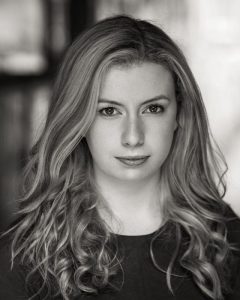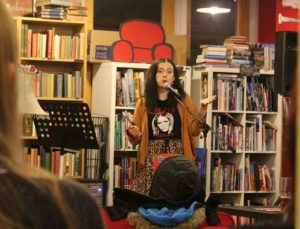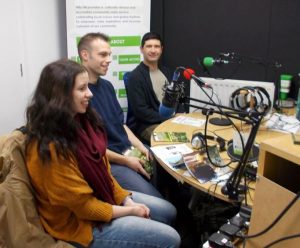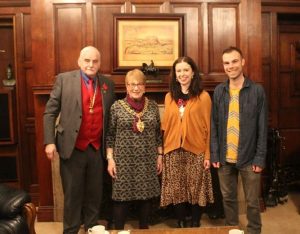AN INTERVIEW WITH SHAUNNA LEE LYNCH
By Prabhjot Kaur

Photography credit: Steve Langan, City Headshots Dublin
Shaunna Lee Lynch is a Cork-native writer, actor, director and producer. Her work weaves modern feminism and pop culture with politics, social commentary and tradition, playfully dismantling conventions. Most recently her play Wishful Thinking premiered at Dublin Fringe Festival 2019 which she wrote, acted in and co-produced. As a spoken word artist, she has performed at events such as Electric Picnic, Cork City Culture Night, LitFest (St. Clementin, France), The Garden Party (Lisbon) and can be found performing regularly at O’Bhéal’s (Cork, Ireland) open mic events. She competed in and won the All-Ireland Poetry Slam in November 2019 with her poems Make the World Gay Again, The Jazz Witch, and The Women of Ireland.
Tell us a little about yourself, your work and the themes you like to explore.
Okay, well I’m from Cork in Ireland. I studied theatre performance here for two years before going to get my degree in Drama at Ireland’s Conservatory of Music and Drama (DIT). After five years of living in Dublin, I lived in Hong Kong for a year working in children’s theatre and teaching English. I had initially planned on stopping back in Cork temporarily on my way back to Dublin but as the rents there became London prices without the London job opportunities and my apprehension about living in a massive city again I decided to stay a bit longer. I’m glad I did because soon I discovered Cork has one of the most vibrant artistic communities I’ve ever come across.
Since coming back to Cork I’ve been involved in some theatre and film projects. I began attending Ireland’s longest running poetry event, Ó’ Bhéal, about two and a half years ago and have been writing and performing poetry since then. My work across all disciplines draws from observations of everyday life, a rebellious nature to break convention, modern feminism, pop culture, politics and traditions.
How did you get into writing/performing and how long have you been doing it for?
I did drama as a child and remember writing plays on bits of paper and stapling them together (to make it official, equating a staple to a publishing deal). Apparently my parents were asked to not to bring me back to my Irish dancing class as I kept going onto the stage in the hall to perform scenes from Snow White by myself, much to the teacher’s annoyance.

Shaunna reading at Fire & Dust poetry night
Who would you say are the biggest influences on your writing? (This can be
writers/musicians/artists, etc.)
I have been nurturing a die-hard Buffy the Vampire Slayer obsession since I was 11. That show has been the biggest influence on my life and in turn my work. I look to pop stars as deities. Like most of my kind, I have taken Beyoncé as my lord and personal saviour. I draw deep into the wells of Madonna, Britney Spears, Ariana Grande, Judy Garland and the Ru Pauls of this world for inspiration. I love hip-hop also, artists like A Tribe Called Quest, Kendrick Lamar and pre-problematic Kanye tuned my ear for rhyme. In terms of poetry, one of my favourite collections is by an American poet Morgan Parker entitled, ‘There Are More Beautiful Things Than Beyoncé.’ There are really great theatre makers in Ireland that I’m very influenced by. I really love the writer/actor/director Greta Gerwig. Frances Ha! is a film of hers which she wrote and also starred in and I was really inspired about how she captured the everyday moments that build us, so wholly. Her body of work and artistic trajectory is a big influence and inspiration to me. I also love her partner’s (Noah Baumbach), work.
You work is largely comprised of poetry and plays. Do you have a preference of one over the other?
Not a preference per say. I don’t really consider myself a poet. Not in a traditional sense. And I’ve never studied it (other than in school) and I don’t know the rules or forms, so feel like an imposter to a certain extent. I can’t reference poets the way my peers do, I suppose because it’s not my sole outlet. For me the idea of the poem has to come first and then I can mould the language around it, but if the idea isn’t there – possessing my hands to type – I find it very hard to come up with anything. Whereas writing for theatre I could sit down with no idea whatsoever and just begin writing dialogue and before I know it a theme or concept or characters have formed. One is inverted and the other is opposite, so I don’t have a preference, I’ll take what comes. I could work individually on a poem over the course over a couple of days and it could be whole whereas a play could take over a year. Poetry also is a very private writing experience whereas for a play it takes a village (to read drafts aloud, workshop it, etc.) to get the script from start to finish.
What was the inspiration behind Wishful Thinking?
It was very much inspired by the book The Secret and self-help culture. I find it hilarious how the western world has appropriated eastern wisdoms/culture/religion for materialistic attainments. There are libraries-worth of books on how to manifest your destiny claiming meditating hard enough can get you a Ferrari (or whatever it is your heart desires). Instagram gurus, self-proclaimed shamans and even Oprah charging a fortune to people wanting to make changes in their lives. It also examines the role faith plays in our lives and with the rejection of traditional religions, what we have adopted instead. That was the initial concept behind it. It’s also about a woman who (due to economic circumstances and exhaustion from trying to make her dreams come through) moves back to rural Cork having lived independently in London for the past decade. This action was partially inspired by my own situation but also the national situation that, due to the price of living costs, moving home has become a reality most adults have had to face nowadays.

Shaunna, alongside Ben Burns and Aysar Ghassan at Hillz FM Radio Station
Was it hard work getting your play ready for this year’s Dublin Fringe? Talk us through the process.
The play premiered at Dublin Fringe 2019. It was hard work, but the Fringe were very supportive every step of the way. The director Ciarán MacArtain and Strive Theatre worked with me from the beginning stages of the script and facilitated the workshopping of each draft, which was integral to the development of the script as it was written and produced within the space of a year. Benjamin Burns, another poet and musician from Cork, did the sound design. We had great support from the artistic community in Cork also. It was no easy feat, but it was a great experience that I learned an enormous amount from.
You came to Coventry in November as part of the Cork-Coventry exchange. How did you find it?
I loved it. Everyone was very enthusiastic and welcoming. We got a great tour around the city and got to learn all about Coventry from Raef and Aysar, our kind hosts for the trip. I loved the old cathedral ruins and the graveyard. It was very atmospheric. Fargo Village was my favourite place and The Big Comfy Bookshop.
Were there any noticeable differences in the poetry gigs in Coventry to those you usually perform at in Cork?
Not particularly, there was more similarities than differences. The themes of people’s work were universal.
Seems like the Cork-Coventry exchange is not the first time poetry has created travel opportunities for you! Do you enjoy performing in other countries? Does it involve any special preparation?
Yes, I love to travel so it’s a great treat to get to go to another country and perform. There’s not much special preparation but because some of my work mentions figures from Irish mythology or culture and slang, I just have to remind myself to give some context.
Has travelling and performing in lots of cities shaped or altered your writing in any way?
Definitely, it’s inspired me to try new things and be more adventurous in my performance.

Shaunna meeting Linda and Kerry Bigham, the Lord Mayor and Deputy Lord Mayor, accompanied by Benjamin Burns
How did it feel winning the All-Ireland Slam?
It was great. I had just flown back from Coventry that day in fact, maybe that was my lucky charm. Last year I competed in the Munster Slam but did not make it into the final 3, possibly because I went over on time quite a bit without realising it, which is cause for marks to be deducted. I was very disappointed as I was very eager to make it to the All-Ireland last year. Because of that disappointment, I decided this year to not emphasise on the winning and just leave it up to fate (and the judges) and enjoy it. I really wasn’t expecting to win, I just gave it socks performing. Luckily it all worked out.
What’s next for you after winning the All-Ireland Slam? Will you go for the All-European Slam next?
I’ll go to the La Coupe De Monde (World Competition) in Paris in May and to the European Championship in Slovenia in November. I hope to perform at music and arts festivals around Ireland and the UK this year. I’ll take any gig going really. I just love to perform and it’s a treat to be asked. I’m not the best at self-promotion, which is something I should probably work on to get more gigs, but at the moment I’m just focusing on the content of my work.
Do you have any upcoming projects or performances we should be excited about?
I potentially could be coming back to Coventry this year to perform, it’s not in stone just yet but keep an ear out. I’ve had to take up a full-time admin job so I can save up to buy camera equipment to start making short films. That’s what I’m currently striving towards. I want to focus on writing and directing short films, and continue to write and perform poetry.
Here’s a poem Shaunna performed at the All-Ireland Slam:
The Women of Ireland
The women of Ireland are mad at you,
you won’t treat us,
you won’t believe us,
your scales are in need of a service.
Lady Justice, Goddess Justitia,
look at what’s been done to you.
You can’t see too well
your blindfold has been pulled too tight
and left on so long
that brambles and ivy have grown over
your once optimistic eyes
and left you lazy.
Is that why you have let us down?
If you are relying on just your ears
perhaps you could not hear us?
There have been centuries of silence,
being shouted over and hushed.
Can you hear us now?
Because we’re screaming.
The banshee is sick of your shit
and she is howling.
The sióga are frantic
with your lack of judgement
and wonder
if they accidentally cursed
you many moons ago
to make you so careless.
They have no record of this
but fairies are not known for their bookkeeping skills.
Off the coasts of Connacht, Leinster
Munster and Ulster
the sirens sing a song of melancholy
as the mermaids mock your
millennia of meekness.
The high goddesses of the Tuath Dé Danann
are quiet in their dispute
of the island’s namesake.
Éiru in particular has gone quite into herself,
her sisters are worried
for her and all the sisters of the land.
Internally re-evaluating their performance
as Goddesses of sovereignty
when what has been happening
has happened for so long and to so many.
They are squeezing the soil in anger,
watering it with tears,
pushing out yellow roses
as the bodhrán beats to the tune of grief.
Can you hear them?
They are screaming
Can you hear us?
We are screaming
Bring your scales back to Argos,
because there’s something wrong with them.
Take off that crusty blindfold,
wash your eyes with chamomile and witch hazel
because there’s something wrong with them.
Clean out your ears with candle wax
and come back to us lady.
Bring your voice and your sword,
you are needed.
We are screaming at you…for you…
to hear us,
to see us,
to treat us,
to believe us.
Check out more of Shaunna on YouTube and Instagram.
